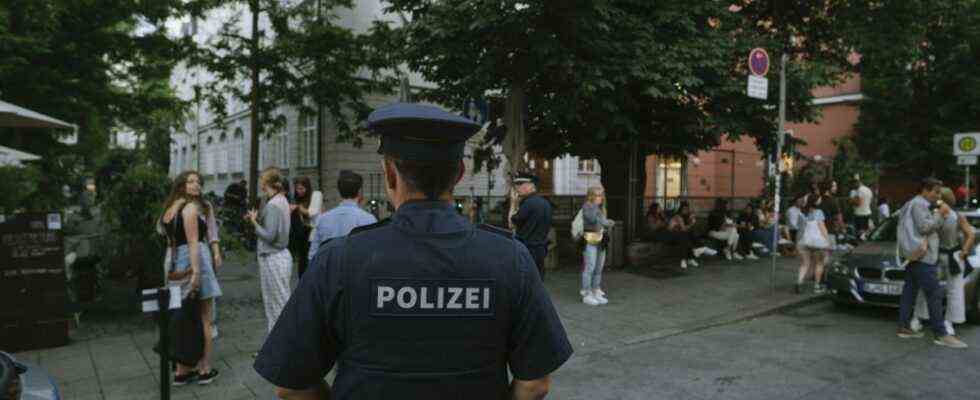The ongoing state of emergency causes the people of Maxvorstadt a lot of trouble, but also a small privilege. They made the annoyance at the citizens’ meeting in the form of drastic eye and ear witness reports, complaints and requests about the current party going on in the university district Luft. They took advantage of the privilege of holding a citizens’ meeting in their own urban district, even if the 156 visitors seemed a bit lost because of the spacing concept spread over the 3000 seats in the Krone building.
Acoustically, most of the speeches filled the arena with ease, especially the residents of Türkenstrasse, with the focus on Georg-Elser-Platz, had brought audible anger with them at what was happening in front of their doors and windows: “Piles of people urinating at the fence”, conditions like in the notorious Schinkenstrasse on Mallorca or “at the Oktoberfest – only without toilets and bouncers”, a “decay of morals” and the like had driven almost two thirds of the 26 active participants to the microphone. Street cleaning and early deliveries to shops and restaurants allowed the night’s sleep to shrink to a time window of two to four in the morning – and that only if “some idiot” was not roaring around again, reported a local resident. The noise equivalent of a jet taking off, 107 decibels, was measured by a neighbor on the corner of Schellingstrasse and Amalienstraße; 87 decibels, the equivalent of a freight train, were still around one o’clock in the morning.
Stephan Funk, Head of Police Inspection 12, had adjusted to the main topic, appeared with four colleagues and devoted his report almost entirely to the problem, the “intensity and scope” of which one had not expected. Funk admitted that it was of course little consolation for local residents that almost exclusively “disorderly disruptions” and hardly any “security disruptions” were registered. Blocking entire streets permanently, or even evacuating them “with the rubber truncheon” was “neither legally nor actually” feasible, explained the PI director.
Radical demands and allegations against the officials were limited to the social media. In contrast, those present expressed their solidarity and respect for the police, even if they had called there in vain on some wild nights about being more present. According to Funk, the focus has not shifted from the Englischer Garten to Türkenstrasse as a result of being driven away, rather two different scenes have formed. According to the motto “I am there because the others are there”, the real cause lies in the smartphone-supported “swarm intelligence”. Gastronomy and, above all, delivery services, which would have supplied the party with cool beer at the supermarket price, at least before the ban on glass bottles, acted as amplifiers. A general ban on alcohol on the streets of the university district remains the most far-reaching demand of the citizens’ assembly. However, the majority of those present rejected an application for the complete closure of the pub gardens, while they would like to see Bluetooth speakers and other sound reinforcement devices banned in the entire city district at night and demand a curfew at 10 p.m., at the latest at 11 p.m. for free bar areas.
Delivery services also cause problems in the district during the day: a resident documented traffic jams and traffic hazards from a “gorillas” distribution center at the southern end of Lothstrasse by video. Public buses do not get past the trucks, delivery cyclists spread out on the sidewalks. A large majority of the assembly demanded access via the former Bruckmann property on Nymphenburger Strasse. The cramped inner city geography is also a problem for the residents of the St-Benno-Quarter. They agreed to the demand for more trees and wells as well as to dedicate the Erzgießereistraße as a bicycle street, although a representative of the mobility department considered this to be impracticable because of the narrow space there.
On the fringes of classic traffic and planning issues, there was time for the basics: A Munich resident who recently moved away from Maxvorstadt had applied, with special permission from the citizens’ plenary, that the city administration should “separate grammatical and biological sex” again in the future, i.e. gender asterisks, internal I and other controversial language regulations. The Maxvorstadt residents rejected this by a large majority.

